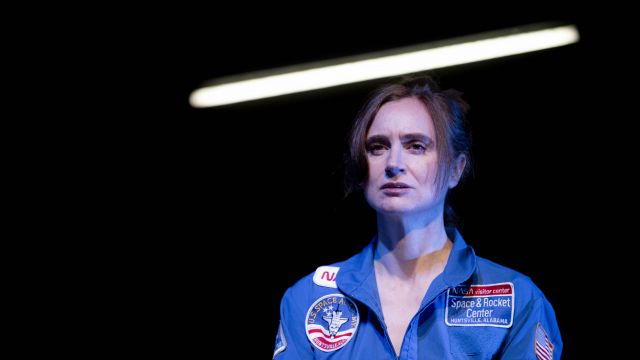Drive
Based on the true story, so the program tells us, of ex-astronaut Lisa Nowak who drove fourteen hours non-stop from Houston, Texas, to Orlando, Florida, to confront – or kill? – her ex-husband’s lover. In the car’s back seat, she carried equipment for disguise, kidnap and murder.
Rebecca Meston has taken that ‘true’ story and made of it a densely detailed, emotional portrait of a desperate woman. She employs a non-linear narrative, moving back in time and falling hard into the speeding car of the present, juxtaposing both for insight, poignancy and metaphor,
In Drive, the courage and competence of Ms Meston’s NASA astronaut, Captain Stella Jones (Lizzy Falkland) and her adventure of being in boundless space, all fall to pieces in contrast to the confined space of a car, and a sad, earthbound obsession with revenge. Here is a woman reduced by shattered hopes and the confinement of society’s expectations. Dressed in her astronaut’s blue overalls, we can never forget what she was.
Apart from her sure touch with her cast, what stands out in Sasha Zahra’s direction of this story is her restraint – which means her confidence about what works: there’s nothing flashy or excessive or obvious here. An example: she and Ms Falkland allow Stella the minimum of facial expressions – at times she is almost robotic – but why not? All she was is shut down on this mission. But her face – and body – suggest so much – and so we read a profound sadness that has replaced even her rage. Now her mission is to drive all the way and then...

Stella’s world was once so vast and now it comes down to the narrowest, most sordid focus. But the car’s backseat also carries memories – the discomfort – and resentment – of her partner Tommy (Christopher Pitman) at her celebrity, of her difficulty with being a good wife and mother, of her meeting with Tommy’s new squeeze (Ashton Malcolm), an amiable but none too bright, low status, unthreatening young woman – and her memories of astronaut training, the high excitement of blast-off and the childlike wonder of watching the sun ‘rise’ over our Earth.
Out there, in space, the voices of Ground Control. Now, as she drives, her only companion is Siri, counting down the miles to Orlando, giving directions and asking, ‘Have you lost confidence in the mission, Captain?’ Extra voices are supplied by Sam McMahon, Tony Mack, Hew Parham and Ian Moorhead. Other characters, who exist in Stella’s memory, seem somehow to appear in the concave window of the capsule – as if looking in from space. Ms Malcolm and Mr Pitman also play these and other roles, distinguishing cleanly and clearly between them.
The multiple times and places are achieved with simple means employed with great imagination – and that includes the audience’s imagination too. Meg Wilson’s set and lighting (the latter mentored by Christopher Petridis) give us – as well as Stella’s car on freeways and through passing lights – the rocket’s blast-off, the confined space of the capsule, and then the bland over-bright light of domesticity. Ian Moorhead’s sound design bolsters and enriches these effects with the voices of Stella’s memory, the roar of rocket engines, the hum of the car’s engine and – magically – the silence of space and the silence of loneliness.
Drive – with all the meanings that one word can carry - runs at a mere forty-five minutes – but those minutes are rich and concentrated, conveying more than many plays twice that length.
Michael Brindley
Photographer: Jodie Hutchinson
Subscribe to our E-Newsletter, buy our latest print edition or find a Performing Arts book at Book Nook.

